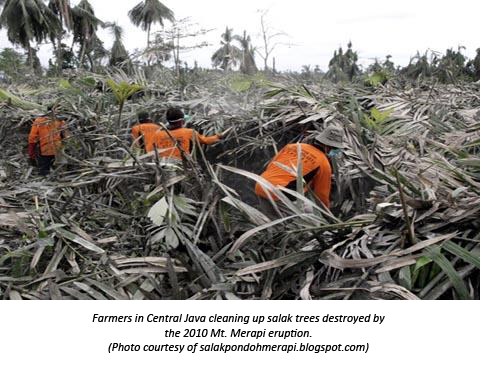The 2010 volcanic eruptions of Mount Merapi, Indonesia severely crippled salak (snake fruit) production in the Central Java area, destroying 1,400 hectares and affecting up to 3,800 hectares of plantations. Sleman Agriculture, Fishery, and Forestry Agency told The Jakarta Post that salak producers lost more than Rp 200 billion (USD 21.8 million) due to the eruption.
Ash were reported to weaken the branches of the trees, causing the fruits to decompose. Locals in Magelang, Central Java said that it would take at least three years before they can harvest from new trees. This paralyzed the local economy as salak trees are the main source of income in Magelang, Central Java.
To prevent the local economy from collapsing, the Indonesian National Disaster Management Agency (BNPB) allocated 8 Rp billion (USD 871k) for its cash-for-work program. Villagers were hired to remove decaying salak leaves and broken fronds, salvaging some of the plants. This can speed up the recovery of the area and provide a substitute income to the farmers.
Meanwhile in Eastern Java, a prolonged 2011 rainy season reduced salak fruit quality and yield. Nyoman Sujana, head of Banjar Dukuh Sibetan Cooperative Unit, said that this dropped the price of salak by almost 70% from Rp 8,000 to Rp 1,500 per kilogram.
With the help of government programs, salak farmers are slowly recovering. Exporters of Fruits and Vegetables Association chairman Hasan Widjaja said that Indonesia exports one ton of salak to Singapore and up to seven tons to China every week during peak. Salak exports are expected to grow annually because Indonesia is the only country that produces the fruit.
The lack of post-processing technology remains the primary obstacle in export, as fruits become overripe when they reach other countries. Overripe fruits are pungent and are not well received by foreign markets.
References
- The Jakarta Post. “Snake fruit and mangosteen are top fruit exports”. The Jakarta Post. 06 June 2011. <Retrieved from http://www.thejakartapost.com/news/2011/06/06/snake-fruit-and-mangosteen-are-top-fruit-exports.html on 20 April 2012>
- The Jakarta Post. “Sultan: A number of areas crippled after Merapi explosion”. The Jakarta Post. <Retrieved from http://www.thejakartapost.com/news/2010/11/03/sultan-a-number-areas-crippled-after-merapi-explosion.html on 20 April 2012>
- Salak Fruit Megalang. “Salak Plantation Rescue Efforts at Merapi Slopes”. Salakpondohmerapi. 10 August 2011. <Retrieved from http://salakpondohmerapi.blogspot.com/2011/06/salak-plantation-rescue-efforts-at.html on 17 August 2012>.
- Suriyani, L.D. “‘Salak’ farmers seek support from tourist industry”. The Jakarta Post. 11 January 2011. <Retrieved from http://www.thejakartapost.com/news/2011/01/12/%E2%80%98salak%E2%80%99-farmers-seek-support-tourist-industry.html on 20 April 2012>
- Susanto, S. “After eruption, ‘the trees are all dying’”. The Jakarta Post. 11 November 2011. <Retrieved from http://www.thejakartapost.com/news/2010/11/11/after-eruption-%E2%80%98-trees-are-all-dying%E2%80%99.html on 20 April 2012>
- Wahyuni, S. “Snakefruit farmers get to cash-for-work program”. The Jakarta Post. 23 November 2010 <Retrieved from http://www.thejakartapost.com/news/2010/11/23/snakefruit-farmers-get-cashforwork-program.html on 20 April 2012>

